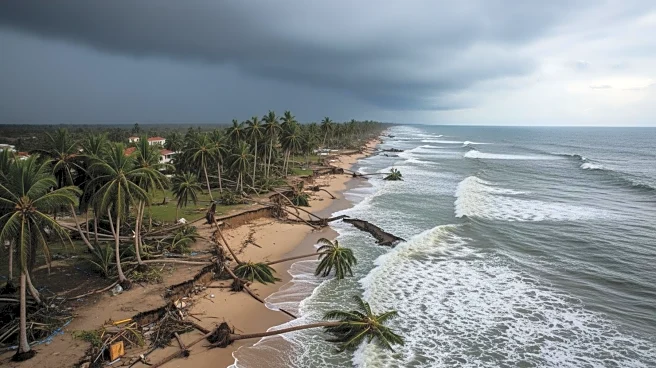What's Happening?
Hurricane Melissa, a Category 5 storm, has caused significant destruction in southern Haiti, particularly in the town of Petit-Goâve. The hurricane, one of the strongest Atlantic storms in recorded history,
resulted in the deaths of at least 43 people in Haiti, with more than a dozen still missing. The La Digue river burst its banks, sweeping away children, cars, and homes. The community is mourning the loss of its residents, including at least 10 children. A protest is planned to demand a quicker response and more aid from the government, as many believe the deaths could have been prevented with better planning and infrastructure.
Why It's Important?
The impact of Hurricane Melissa on Haiti is profound, exacerbating existing challenges such as poverty, political instability, hunger, cholera cases, and gang violence. The storm has left hundreds homeless and jobless, with many going hungry. The U.N.'s World Food Program has distributed food to over 40,000 people and plans to issue cash transfers. However, funding issues have hindered prepositioning of contingency stock. The aftermath of the hurricane could lead to increased deaths, with suspected cholera cases already reported. The situation highlights the urgent need for international aid and improved infrastructure to prevent future tragedies.
What's Next?
Efforts to provide aid and restore the community are underway, with the U.N. and UNICEF working to rehabilitate water pumps, install hand-washing stations, and set up mobile clinics. The World Food Program is addressing food shortages, but challenges remain due to funding constraints. The planned protest may pressure the government to act more swiftly. Long-term recovery will require rebuilding homes, restoring markets, and addressing health concerns. The international community's response will be crucial in supporting Haiti through this crisis.
Beyond the Headlines
The hurricane's devastation underscores the vulnerability of Haiti to natural disasters, compounded by socio-economic and political issues. The lack of infrastructure and preparedness highlights the need for sustainable development and disaster risk reduction strategies. The crisis may prompt discussions on climate change adaptation and resilience building in vulnerable regions. The humanitarian response will need to address not only immediate needs but also long-term recovery and development to prevent future disasters from having such catastrophic impacts.










